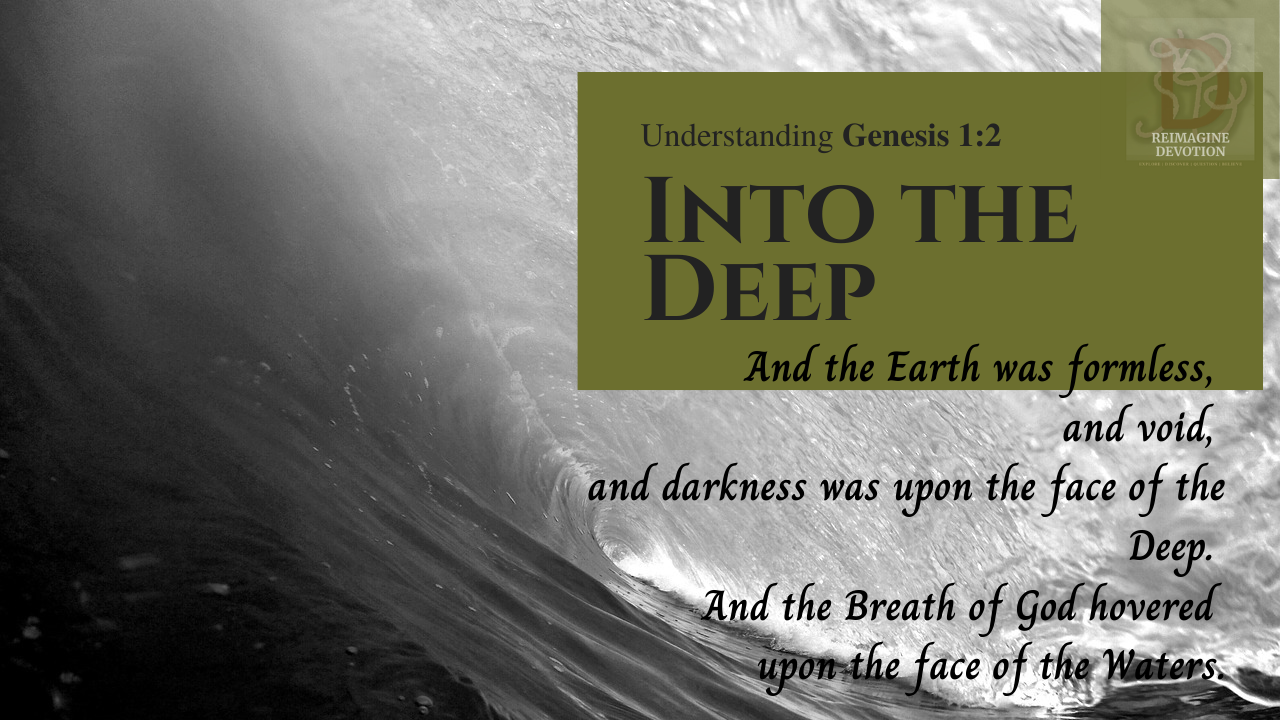The Deep
To the ancient mind, this word conjured images of a bottomless ocean which continued down and down and down until its waters opened into  the mouth of the Underworld.
the mouth of the Underworld.
This was an eternal prison for the dead, and for the monsters that the gods had trapped there at the beginning of the world – a place of uncertainty, of death, and often of non-existence.
Genesis 1:2 uses two different words to describe one concept: the Deep, and the Water. Both reference the ocean, but not the oceans that modern science has mapped.
Check out this video trailer!
Primordial
Genesis chapter 1 refers not to the ocean as we know it, but to the primordial and mythological ocean. It existed before the earth, and in many mythologies, gave birth to the gods. The earth itself, dry land, was humanity’s lifeboat in the midst of this endless and treacherous water.
The Deep served as a gateway into the land of the dead, but also as the origin of all life. Ironic, that the ancient world understood what modern science now tells us must be true: that life began not on land, but in the waters.
Myth
Just about every mythology begins with this concept of the Deep.
Chaos.
The Abyss.
Oblivion.
It has different names, and it is not always water. But it is always endless, bottomless, simultaneously the giver of life, and the doorway into 
death. It is a primal power, which draws us back to our most primitive needs and fears. It is a power beyond us, a mystery which we cannot fully comprehend—the Nothingness beyond creation.
From this primal power, the ancient myths tell us the gods came… somehow.
Because where else could the gods come from?
But eventually, in order to create human civilization, the gods of the ancient myths go to war with the Deep, chain up it’s chaotic powers, and bring order into creation.
Genesis 1:2 is one such war story. It tells of two great powers: God, and Oblivion – the Spirit and the Waters. It is not a unique story, but it is told in a unique way.
In our story, God does not come from inside the Deep. God moves upon its surface. God existed always outside the Deep, and its power was never any match for God’s. There is no war in Genesis, no great cosmic struggle. There is simply God, moving over Oblivion and creating life, order, nature, harmony.
Even back here in the beginning, the powers of evil were never any match for God. This holds true for whatever chaos and evil might come into our lives today. Chaos and Evil are only passing shadows over our lives, an echo of the ancient Deep that God once dispelled with nothing more than a word.
They will not last.

Where do you find chaos and turmoil in your life? Are there things about this world that make you want to give up? And where do you see God working in the chaos?
Share what you’re comfortable sharing in the comment section below!

I love the way you approached this topic. I’ve always found the creation story in Genesis to be very fascinating. When I hear people talking about how the Bible shouldn’t be taken literally, I don’t take it the wrong way, because I have a different understanding of what that means. They had a very limited vocabulary back then and their ability to describe what they saw and experienced would not have matched how we would have described the same things today. Obviously no one saw the creation story as it occurred, but the same can be said about how it would have been conveyed to the readers of these ancient scriptures. As it is, just the thought of something as magnificent and abstract as creation itself would be hard even for the most learned of minds to comprehend. Thanks so much for sharing!
Mark
Thanks Mark, and great to hear from you! I love that you brought up a “limited vocabulary” because the vocabulary of ancient Hebrew was, literally, about a quarter the size of our modern English vocabulary (which is actually the largest vocabulary known to have ever yet existed. Mandarin Chinese is the next largest). I assume that’s not exactly what you had in mind – unless it was? – but it made me smile. And yes, even with the largest vocabulary ever, we modern English speakers still find it difficult to express these things.
Awesome, this is really cool. It is true that it is time to limit vocabularies; longer word do not carry bigger meaning and are often misunderstood. Soon actually words will carry no meaning and people will be able to read each other emotions and I assume that’s not what you might have thought, but it will come to pass. Even with the largest vocabulary ever we use some times, most of the time we only make the sound of them. I personally speak five langues and as ESL speakers still find it difficult to express many things due to many confusing long words.
Five languages, that is awesome. I don’t speak five. In fact, I’m only on “speaking terms” with Spanish and English. But I’ve studied eight, and can read five of those, more or less.
I personally like big vocabularies, because they do allow you to express a lot more. But they also create the unique problem of arguing over the minute meanings of words. For instance, the Greek vocabulary is larger than the Latin vocabulary, so in the early days of Christian history, the Greek speaking church had more trouble defining things, like the nature of God, than the Latin speaking church did. The Greek speaking church got into more arguments and outright theological fights simply because they had more words available to them. Meanwhile the Latin speaking church just sat back and wondered “What are you all even talking about?” However, despite the turmoil, what the Greek church had to go through was actually good, because it forced Christianity to define itself. It is only because of the theological struggles of the early church that we Christians have any understanding or agreement about these important theological issues. And there’s still a lot of disagreement, so just imagine how things would be without the early arguments!
So I would argue that larger vocabularies are good. The thing to recognize, though, is that “big words” are not better or even more descriptive than “small words.” Also, when it comes to translation, I believe people need to be aware that the same word in, say, the Hebrew language, can be translated in a number of different ways in English.
I have to be honest with you I was actually really excited to get this interest match because I love the Book of Genesis just to tell you a little bit about how much I love it I actually named my son Genesis after the book because it’s a wonderful book it’s the beginning of it all and it tells so much about us as human beings now and why we ended up where we are today I love the color of your sight I love the separation and how you put a video in the middle of it so good job on that the wording is good so you know maybe you can accept this comment and maybe we could chat sometime about the Book of Genesis together
Hi Jeremy, thanks for stopping by! I never thought of Genesis as the name for a person, but I think it works. Genesis has always been one of my favorite books, but just after seminary I did this bible study exercise where I read and did commentary on the first two chapters of Genesis verse by verse, and my mind blew up with all the new things I noticed crammed into just these two chapters. That exercise is the backbone of these Genesis articlesGenesis articles I’m posting now I love talking about this stuff, so if you want to chat more, either keep stopping by, subscribe and comment on my YouTube channelmy YouTube channel, or my email shanna@reimaginedevotion.com. A new Genesis post will come out at least once a week until I get through chapter 4 (so, for quite a while). Hope to hear from you again!
Hi it’s good how you explain it it is amazing .and thank you for sharing,3And God said: “Let there be light.” Then there was light.4After that God saw that the light was good, and God began to divide the light from the darkness.5God called the light Day, but the darkness he called Night. And there was evening and there was morning, a first day.6Then God said: “Let there be an expanse between the waters, and let there be a division between the waters and the waters.”7Then God went on to make the expanse and divided the waters beneath the expanse from the waters above the expanse. And it was so.8God called the expanse Heaven. And there was evening and there was morning, a second day.9Then God said: “Let the waters under the heavens be collected together into one place, and let the dry land appear.” And it was so.10God called the dry land Earth, but the collecting of the waters, he called Seas. And God saw that it was good.11Then God said: “Let the earth cause grass to sprout, seed-bearing plants and fruit trees according to their kinds, yielding fruit along with seed on the earth.” And it was so.12And the earth began to produce grass, seed-bearing plants and trees yielding fruit along with seed, according to their kinds. Then God saw that it was good.13And there was evening and there was morning, a third day Genesis 1_3_13 and I like how you explain it and continue it’s good article
Thanks Tiga, great to hear from you! After years of study, Genesis 1-4Genesis 1-4 has become one of my absolute favorite parts of the bible (to be fair, I have a lot of favorites). I’ve learned a lot about the times and people behind these stories, and just want to share that knowledge now with others.
Interesting interpretation. I had always thought the Deep was somewhat related to Hell or the underworld.
As you mention, many gods from other religions were born out of the Deep. It’s interesting to see the number of similarities between the Bible and the books from other religions.
There are many things I don’t understand about the Bible. I remember when they first taught us about the Creation. At the time, I didn’t give it too much thought, but now, there are some things I can’t understand. For instance, how was it possible that light was first created and then the sun? Well, that’s another topic.
Thanks for sharing your thoughts with us.
Hi Enrique. There’s a lot of confusion about Genesis today (well, probably always has been) the main problem surrounding the question of whether Christians have to take Genesis 1 literally (contradicting modern science), or if it’s better thought of as metaphor, symbolism, or allegory. There’s a lot of variety in how that question can be answered, which adds to the confusion. I myself was raised to take Genesis literally. Ironically, like you, I didn’t think about what was actually written in Genesis 1 much until I stopped taking Genesis literally. That’s when I noticed all the symbolic meanings, things that speak in profound ways to my own personal life and faith today.
For the creation of light, you might want to check out my post of Genesis 1:4, and also Genesis 1:3. In my opinion, the light created on Day 1 is symbolic, a separation between good and evil, existence and oblivion, etc. It also harmonizes quite well with the idea of a Big Bang bringing matter and energy suddenly into existence.
I’ve done a lot of study of ancient mythology. It’s a passion of mine, and occupied a large space in my graduate school research. My master’s thesis was actually on the development of the concept of hell in early Christian theology and it’s relationship to ideas about the underworld and the afterlife. The parallels between Genesis 1 and other creation stories from the Ancient Near East are strong and, from a scholarly perspective, undeniable. But the writer of Genesis makes a lot of significant changes to the common creation myth that all speak to a unique perspective on God and humanity.
You have touched on theories I hadn’t thought of before. My take on the subject is that the entire earth was covered with water and called the deep. “God moved upon the face of the waters”.
Verse 9 God said ” let the water under the heavens be gathered together unto one place, and let dry land appear, and it was so.
Difficult to understand, but we do all believe God is all powerful and can do anything.
The creation story is 1 chapter long but an entire book could be devoted to it if their would have been man there to watch it unfold.
Keep up the teachings!
An entire book devoted to Genesis 1 – or a long series of blog posts, in my case – yes. I’ll be getting to verse 9 in the near future, and there’s a lot of interesting stuff there too. Genesis, like the rest of the bible, can be difficult to understand at times, because it was written a very long time ago for people who made different assumptions about life than we do. But I find that the more I learn about those people, the easier their stories are to understand.
Hi Shanna,
wrt Gen 1:1, I have a different way of looking at it. To me, Gen 1:1 is an introductory sentence, just as Gen 2:1 is a concluding sentence – like bookends.
The detail of the creation story is Gen 1:2 – Gen 1:30. The creation of Heaven is referenced in Gen 1:1 and is described in more detail in Gen 1:6 – Gen 1:8. The creation of Earth is referenced in Gen 1:1 and is described in more detail in Gen 1:9 – Gen 1:10.
So this would mean that the creation story begins at Gen 1:2 with a description of the earth (universe?) as it existed prior to the creation events. rgds, Ian.
I agree that Genesis 1:1 is an introductory statement. It functions a lot like a chapter title in a modern book, summing up the coming events – namely the creation of heaven and earth (or, in the ancient way of thinking, all of reality). The rest of the story explains how that creation took place, ending in Genesis 2:1-3 with the description about the cosmos being finished and God resting on the seventh day.
If Genesis 1:1 is like a title, then Genesis 1:2 is like the opening paragraph, where the writer sets up the scene before us. So yes, Genesis 1:2 describes the state of the universe prior to existence. The writer describes a state of disorder, emptiness and nothingness. The “tehom” (Deep) is an abyss, and “the water” (that is, the ocean) was, throughout the ancient world, a euphemism or symbol for chaos, destruction, and oblivion. God’s creative work, and that work alone, puts an end to the nothingness.
Good insight.